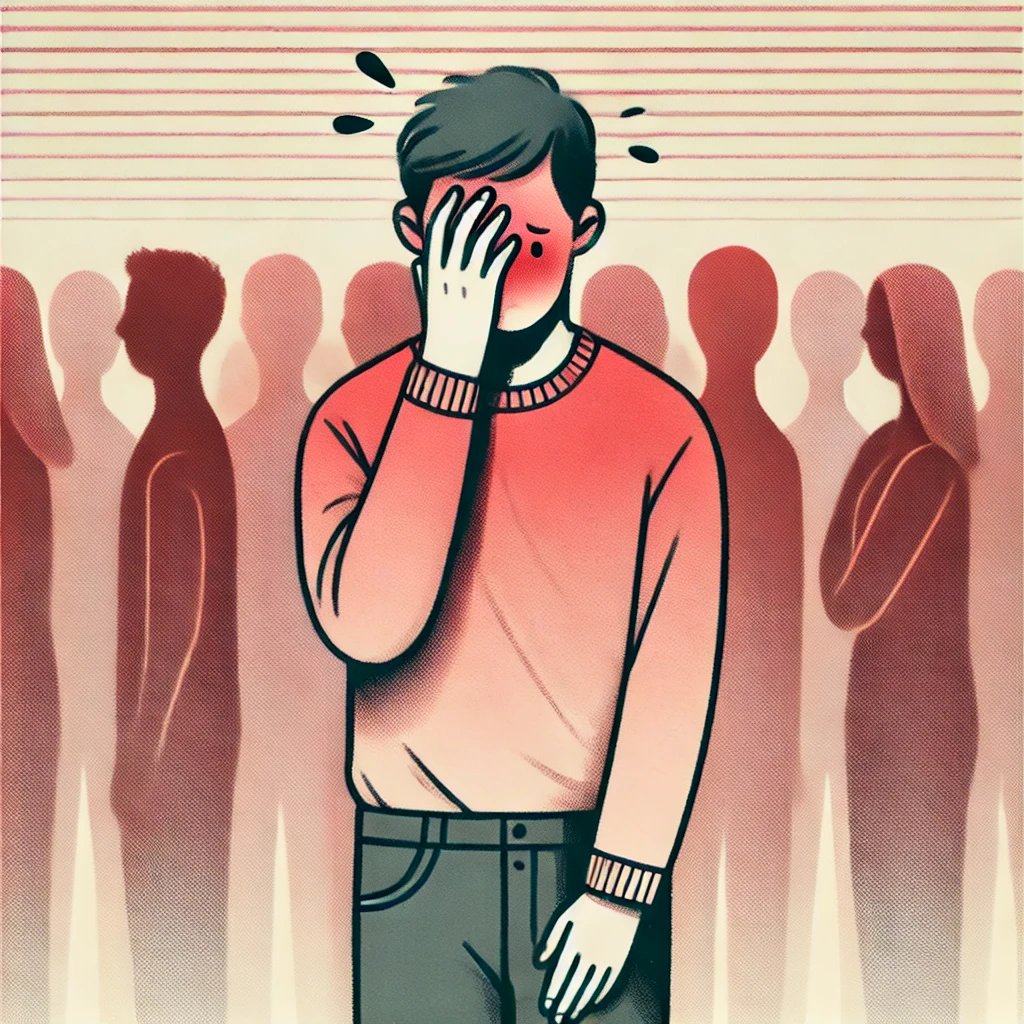Embarrassed
Definition
Embarrassed is an adjective that describes a feeling of self-consciousness, shame, or awkwardness due to a situation that is uncomfortable, socially awkward, or humiliating.
Parts of Speech
- Adjective
Pronunciation
American English
- IPA Pronunciation: /ɪmˈbɛrəst/
- Respelling: im-BARR-uhst
British English
- IPA Pronunciation: /ɪmˈbærəst/
- Respelling: im-BARR-uhst
Etymology
The word "embarrassed" originated from the French word "embarrasser," meaning "to block or obstruct." This was derived from the Spanish "embarazar," with roots in Latin "barra," meaning "bar" or "obstacle." Over time, the meaning shifted from physical obstruction to a state of feeling hindered or socially uneasy.
Derivatives
- Embarrass (verb)
- Embarrassment (noun)
- Embarrassingly (adverb)
- Embarrassedly (adverb)
- Unembarrassed (adjective)
Synonyms
- Humiliated
- Awkward
- Self-conscious
Antonyms
- Confident
- Assured
- Composed
Usage
The adjective "embarrassed" is often used to describe a feeling of discomfort in social situations, as in "He felt embarrassed when he tripped in front of everyone." It is also used to describe reactions to awkward or socially sensitive topics.
Related Terms
- Shame: A feeling of guilt or embarrassment over something dishonorable.
- Mortification: An intense feeling of embarrassment or shame.
- Awkwardness: A sense of discomfort in social situations.
Detailed Definitions
Adjective
- Feeling or showing a sense of self-consciousness or shame: Refers to a state of feeling uncomfortable or humiliated.
- Example: "She looked embarrassed when she realized her mistake."
- Causing someone to feel awkward or uncomfortable: Used to describe situations that create social discomfort.
- Example: "He became embarrassed after forgetting his lines on stage."
embarrassed



🇨🇳 Mandarin
- 尴尬
- IPA: /ˈɡan˨˩˦ ˈɡa˨˩˦/
- Respelling: gāngà
🇮🇳 Hindi
- शरमाया हुआ
- IPA: /ʃərˈmaː.jaː hʊaː/
- Respelling: sharmāyā huā
🇪🇸 Spanish
- Avergonzado
- IPA: /aβeɾɣonˈθado/
- Respelling: avergonzado
- Apenado
- IPA: /apenˈado/
- Respelling: apenado
🇫🇷 French
- Embarrassé
- IPA: /ɑ̃.ba.ʁa.se/
- Respelling: embarrassé
- Gêné
- IPA: /ʒe.ne/
- Respelling: gêné
🇸🇦 Modern Standard Arabic
- محرج
- IPA: /muħˈraj/
- Respelling: muḥraj
- خجلان
- IPA: /xaʒˈlaːn/
- Respelling: khaǧlān
🇧🇩 Bengali
- লজ্জিত
- IPA: /lɔd͡ʒd͡ʒit̪/
- Respelling: lojjit
🇷🇺 Russian
- Смущенный
- IPA: /ˈsmuʂʲɪnːɨj/
- Respelling: smushchyonnyy
- Замешательстве
- IPA: /zəmʲɪˈʂatʲɪlstvʲɪ/
- Respelling: zameshatel'stve
🇵🇹 Portuguese
- Envergonhado
- IPA: /ẽʃveɾɣoˈnaðu/
- Respelling: envergonhado
- Constrangido
- IPA: /kõstɾɐ̃ˈʒidu/
- Respelling: constrangido
🇮🇩 Indonesian
- Malu
- IPA: /ˈma.lu/
- Respelling: malu
🇩🇪 German
- Verlegen
- IPA: /fɛɐ̯ˈleː.ɡən/
- Respelling: verlegen
- Peinlich
- IPA: /ˈpaɪ̯nlɪç/
- Respelling: peinlich
🇯🇵 Japanese
- 恥ずかしい
- IPA: /hazukashii/
- Respelling: hazukashii
🇻🇳 Vietnamese
- Xấu hổ
- IPA: /saw˨˩ ho˧˥/
- Respelling: xấu hổ
🇰🇷 Korean
- 창피한
- IPA: /t͡ʃʰaŋ.phi.han/
- Respelling: changpihan
🇹🇷 Turkish
- Utangaç
- IPA: /utaŋˈɟat͡ʃ/
- Respelling: utangaç
- Mahcup
- IPA: /maˈhːd͡ʒup/
- Respelling: mahçup
🇵🇰 Urdu
- شرمايا ہوا
- IPA: /ʃərˈmaː.jaː hʊaː/
- Respelling: sharmāyā huā





